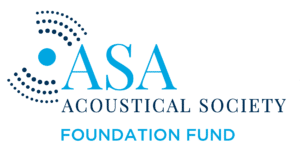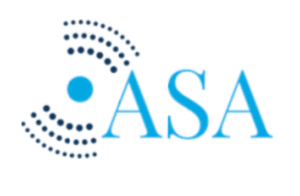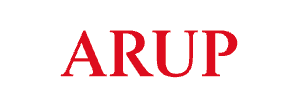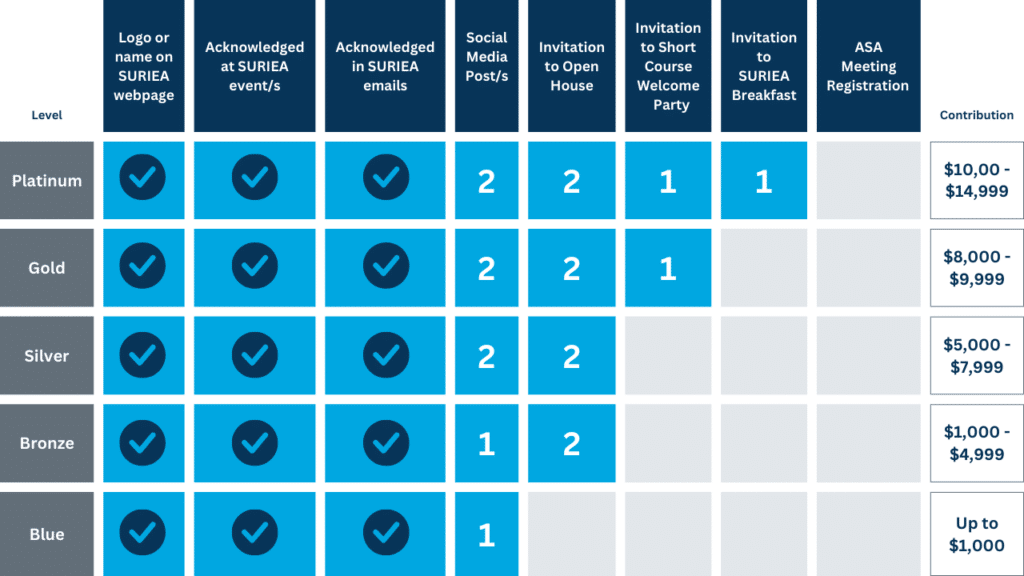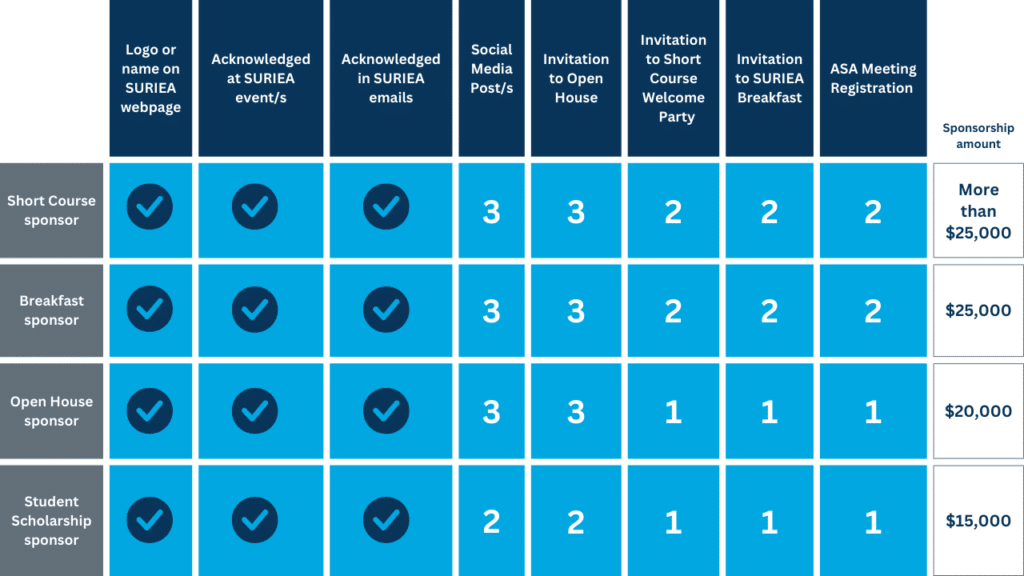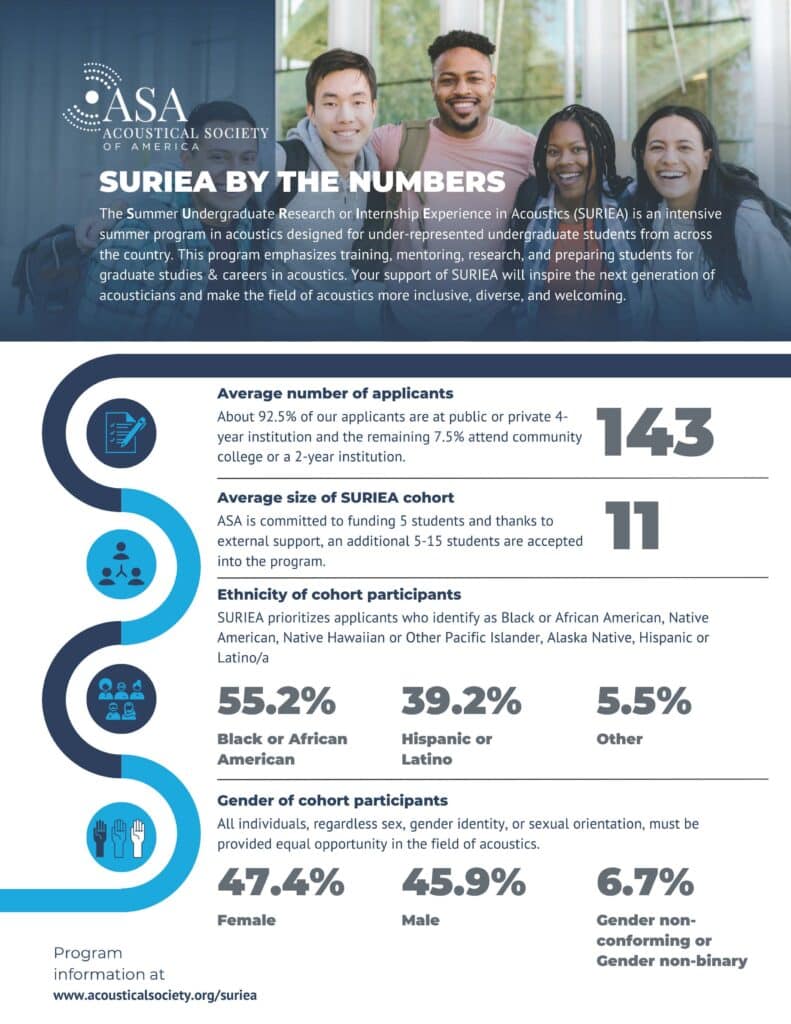TECHNICAL PROGRAM AND SPECIAL SESSIONS
Contributed papers are welcome in all branches of acoustics. The technical program will consist of lecture and poster sessions. Technical sessions will be scheduled Monday through Friday, 23-27 May 2022.
Every effort will be made to schedule contributed abstracts in accordance with author and Organizing Committee preferences. Assignments will take into account: a) author preference, b) program balance, and c) Technical Committee instructions. Abstracts will be rejected if they do not comply with the abstract submission guidelines and submission instructions.
Note that some Technical Committees do not schedule poster sessions. Authors should be prepared to accept assignment to lecture or poster sessions.
Special sessions described below are planned for the meeting. Authors of invited papers must indicate the title of the special session in which they have been invited to participate when the abstract is submitted. Authors of contributed papers have the option to request placement of their abstracts in these sessions. If no special session placement is requested, contributed papers will be scheduled in sessions with abstracts of similar technical content.
ABSTRACT SUBMISSION GUIDELINES
● An abstract of not more than 200 words is required for each paper, whether invited or contributed. All abstracts must be submitted by 24 January 2022. This deadline will be strictly enforced. Abstracts submitted via postal mail or e-mail will not be accepted. Abstracts will be rejected if they do not comply with the instructions.
● Authors should be prepared to accept assignment to lecture or poster sessions.
● Authors of invited papers must indicate the title of the special session in which they have been invited to participate at the time the abstract is submitted.
● Authors of contributed papers may request placement of their abstracts in special sessions. The request will be honored, if possible, but there is no guarantee such abstracts will be scheduled in the requested sessions.
● If no special session placement is requested, contributed papers will be scheduled in sessions with abstracts of similar technical content.
● Submitted abstracts will not necessarily be accepted for the meeting. Acceptance is based on the following factors: adherence to the guidelines given here, clarity of writing, originality of the contribution, appropriateness of the subject matter to the ASA, correctness of the content, and the significance of the contribution. The ASA reserves the right to reject any submitted abstract without giving extensively documented reasons.
● The presentation, and therefore the abstract, must be relevant to the field of acoustics, and focus on scientific developments, applications, standards, or education. Statements of political advocacy or explicit advertisement of products or services must be avoided.
ABSTRACT DISCLOSURE STATEMENTS
Authors will be asked to answer the following questions during the submission process:
● Compliance with the ASA Ethical Principles
● All contributing authors of this abstract concur with the submission of this abstract, with their names being included and with the order in which the names are listed
● The author list is complete-no name has been omitted of any person who has contributed substantially to the intellectual and creative aspects of the work. Enter all authors’ names in the correct order as it will not be possible to make changes or add authors later.
● Author status as a student or early career presenter.
ASA BEST PAPER AWARDS FOR STUDENTS AND YOUNG PRESENTERS
All ASA Technical Committees/Group will offer Best Paper Awards to students or young presenters at the Denver meeting. Authors need not be members of ASA to qualify. If you want your paper to be considered for an award, you must indicate this when you submit your abstract. Please read the entry qualifications below to be sure that you are eligible.
ABSTRACT LIMITATIONS
● Authors contributing papers in Speech Communication are also encouraged to select poster-style presentation which is the default for Speech Communication sessions.
● Contributed papers in Psychological and Physiological Acoustics and Underwater Acoustics may be scheduled for lecture or poster presentation.
● While authors may indicate a preference for presentation style, it may not always be possible to honor the request. Authors should be prepared to accept assignment of their abstracts to either lecture or poster presentation.
INSTRUCTIONS FOR SUBMITTING ABSTRACTS ONLINE
Complete instructions for the preparation and submission of abstracts is provided online.
Acknowledgment that your abstract has been received will be sent by e-mail. Please note that if you do not receive an email message your abstract has not been entered into the database.
1. Online Abstract Submission site is accessed on the ASA Home Page at http://AcousticalSociety.org
2. Click “Submit Abstract for the Denver meeting” from the main page
3. You must first create an account and set up a username and password if you have not already done that in connection with submission of abstracts for prior ASA meetings.
4. After logging into the submission site, click the “Submission” tab.
5. To begin a new abstract click “Create a New Abstract” in the sidebar located on the left-hand side of the screen.
6. If at any time during the submission process you need technical support click the “Get Help Now” button at the top of the screen.
7. Abstracts are limited to 200 words (approximately 1500 characters).
8. The body of the abstract can be cut and pasted into the submission site. Note that LaTex coding must be entered using the Special Character palette which appears on the Title/Body Screen.
9. Enter all authors and their affiliations in the order they should appear in the abstract. Note: Only one affiliation may be included for each author.
10. Carefully check the proof of your abstract. Make sure all special characters and formatting are displaying properly and that the authors and affiliations are listed in the proper order.
11. When all the required information for your submission is entered, the “Submit Abstract” button will appear at the Proof and Submit stage. Click the “Submit Abstract” button to submit the abstract.
12. Upon submission of your abstract you will receive an e-mail confirmation.
13. To view or edit an existing submission click “View Submissions” in the sidebar located on the left-hand side of the screen.
14. To edit an existing submission you must select “Return to Draft” and then select “Edit.” All abstracts that are returned to draft must be resubmitted to be entered into the system. If not, the submission will remain in the Drafts table.
ACKNOWLEDGMENT OF RECEIPT OF ABSTRACTS SUBMITTED ONLINE
Corresponding authors will receive an e-mail message confirming that their abstracts have been received. Acceptance notices will be sent to authors in March.
BEST PAPER AWARDS FOR STUDENTS AND YOUNG PRESENTERS
Several ASA Technical Committees offer Best Paper Awards to students and young presenters who present papers at Society meetings. If you want your paper to be considered for an award, you must indicate this when you submit your abstract. Follow the instructions for the appropriate technical area that appear below.
BEST STUDENT PAPER AWARDS
Committees Offering These Awards: Acoustical Oceanography, Animal Bioacoustics, Architectural Acoustics, Engineering Acoustics, Musical Acoustics, Psychological and Physiological Acoustics, Signal Processing in Acoustics, Speech Communication, Structural Acoustics and Vibration, and Underwater Acoustics
Award Amounts: For each of the Technical Committees granting awards, up to two awards will be presented to students presenting papers in sessions organized by the specific Technical Committee: USD $300 for first prize and USD $200 for second prize.
Qualifications:
To qualify for each of these awards, an author must:
• be enrolled as a student at least half-time (graduates are eligible if the work being presented was performed
as a student within one year of the meeting). Note that you do not need to be a member of the ASA to qualify.
• be listed as the first author on the submitted abstract
• present the paper at the meeting
Special Note for Speech Communication and Psychological and Physiological Acoustics entries: Choose Poster Only as your preferred presentation type during the abstract submission process to be eligible for the Best Student Poster Award Competition for Speech Communication or Psychological and Physiological Acoustics. If you do not choose ‘Poster Only’ and your paper is subsequently assigned to an oral presentation, you cannot be considered for the Best Student Poster Award Competition for Speech Communication or Psychological and Physiological Acoustics. In addition, you cannot enter both Speech Communication and Psychological and Physiological Acoustics competitions.
Selection: The award winners will be selected by a subcommittee of each of the Technical Committees granting awards, based upon the quality of both the content of the paper and its presentation. The awards will be announced either at the meeting of the Technical Committee or after the close of the meeting.
Application: All those who wish to participate in the competition for these awards must indicate their intention to enter the competition during the abstract submission process by clicking the entry box on the online submission form.
BEST “OUTSTANDING PAPER BY A YOUNG PRESENTER” AWARDS
Note that you need not be a student to qualify for this award.
Committees Offering These Awards: Noise
Award Amounts: Up to three awards of USD $250 each will be given for outstanding papers presented in sessions organized by the Technical Specialty Group on Computational Acoustics.
Qualifications:
To qualify for an award, the paper author must:
• be under 30 years of age as of 1 January 2022
• be listed as the first author of the paper and actually present the paper
Selection: Selection of the award winners will be based on the quality of the presented paper, comprising both the content and its delivery. The award winners will be chosen by a subcommittee of the Technical Committee and will be announced after the close of the meeting.
Application: The Award Subcommittee would like to consider papers by all authors who meet the eligibility criteria. Neither membership in the Acoustical Society, nor previous experience in the ASA, is required. Because the committees have no other way to identify eligible authors, however, it is essential that eligible authors indicate their intention to enter the competition during the abstract submission process by clicking the entry box on the online submission form.
BEST “OUTSTANDING PAPER BY AN EARLY CAREER PRESENTER” AWARDS
Note that you need not be a student to qualify for this award.
Committee Offering These Awards: Computational Acoustics
Award Amounts: Up to three awards of USD $250 each will be given for outstanding papers presented in sessions organized by the Technical Committee on Noise.
Qualifications:
To qualify for an award, the paper author must:
• be current students and early career professionals who completed their final degree within the past 5 years
• be listed as the first author of the paper and actually present the paper
Selection: Selection of the award winners will be based on the quality of the presented paper, comprising both the content and its delivery. The award winners will be chosen by a subcommittee of the Technical Specialty Group and will be announced after the close of the meeting.
Application: The Award Subcommittee would like to consider papers by all authors who meet the eligibility criteria. Neither membership in the Acoustical Society, nor previous experience in the ASA, is required. Because the committees have no other way to identify eligible authors, however, it is essential that eligible authors indicate their intention to enter the competition during the abstract submission process by clicking the entry box on the online submission form.
BIOMEDICAL ACOUSTICS STUDENT PAPER AWARD
The ASA Technical Committee on Biomedical Acoustics offers a Best Student Poster Award to students who present at meetings. Students who enter the competition are expected to give an oral presentation in a regular/special session and defend a poster in a separate student poster session. Only the poster presentation will be judged for the competition. Abstracts submitted by students who elect to participate in the competition will be listed in the program in appropriate oral sessions. Please read the entry qualifications that appear below to be sure you are eligible and follow the instructions for entering the competition.
Award Amounts:
Up to three awards will be presented to students presenting papers in sessions organized by the Technical Committee on Biomedical Acoustics and participating in the special student poster session: USD$500 for first prize, USD$300 for second prize, and USD$200 for third prize.
Qualifications:
To qualify for an award, a student must:
• be enrolled as a student at least half-time (graduates are eligible if the work being presented was performed
as a student within one year of the meeting). Note that you do not need to be a member of the ASA to
qualify.
• be listed as the first author on the submitted abstract
• present the paper at the meeting
• defend the poster at a special student poster session, which will be open to all attendees
Selection:
The awardees will be selected by a panel of judges, based upon the quality of the content of the poster and a brief presentation to the judges during a designated poster session. The award winners will be announced either at the meeting of the Biomedical Acoustics Technical Committee or after the close of the meeting.
Application:
All those who wish to participate in the competition must indicate their intention by clicking the entry box on the online abstract submission form. Additional details will be sent to entrants after the program has been organized.
AUDIO-VISUAL AND SPECIAL EQUIPMENT AND SOFTWARE
AUDIO-VISUAL EQUIPMENT
PC computers with monaural audio playback capability, computer projectors, and laser pointers will be provided in all lecture sessions. All other equipment is considered special equipment. Refer to the “Special Equipment” section below for additional information. Mac computers will not be provided.
SPECIAL EQUIPMENT, COMPUTER EQUIPMENT, AND SOFTWARE
Any equipment other than PC computers with monaural audio playback capability, computer projectors, and laser pointers is “special equipment.” Requests for special equipment (e.g., stereo sound, special speakers) must be specified at the time of abstract submission. Provision of unusual special equipment will depend upon availability and cost. Special software requests should also be made, if required.
Stereo sound is considered special equipment and must be requested when your abstract is submitted. Please be specific about your audio needs, including number of channels and preferred loudspeaker arrangement.
POSTER SESSION BOARDS
Poster boards and fastening materials will be provided. Poster boards are 8 ft. wide by 4 ft. high.
PROJECTION GUIDELINES FOR AUTHORS
A PC computer with monaural playback capability and projector will be provided in each meeting room on which all authors who plan to use computer projection will load their presentations. Authors should bring computer presentations on a USB drive to load onto the provided computer at least 30 minutes before the start of their sessions. Assistance in loading presentations onto the computers.
Note that only PC format will be supported so authors using Macs must save their presentations for projection in PC format. Also, authors who plan to play audio or animations during their presentations should ensure that their sound and animation files are also saved on the USB drive. They must also provide their own connectors.
Guidelines for use of computer projection will be supplied with acceptance notices.
AUDIO/VISUAL PREVIEW ROOM
Computer presentations can be reviewed by authors in the audio/visual preview room at the meeting

